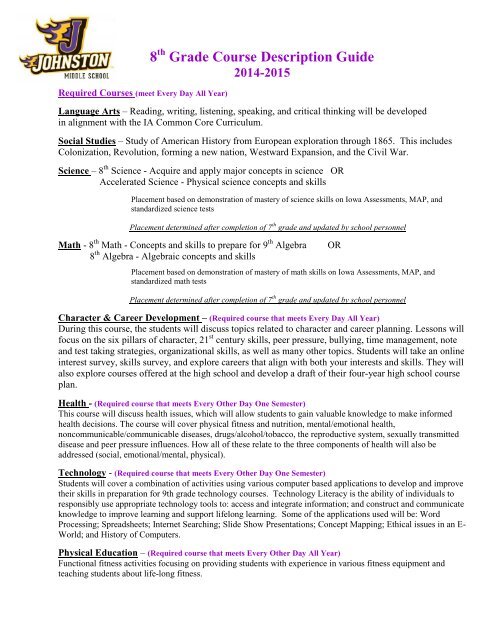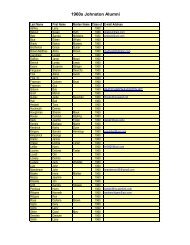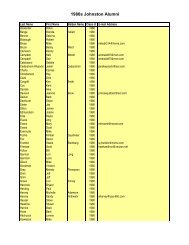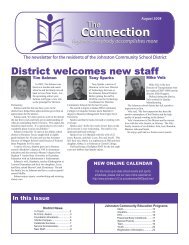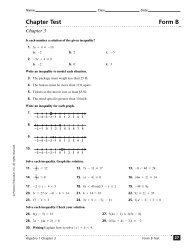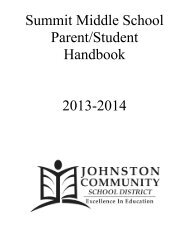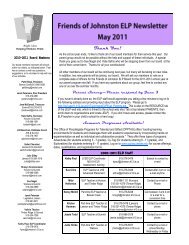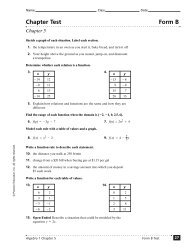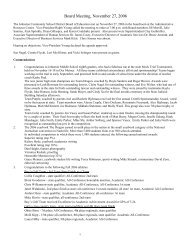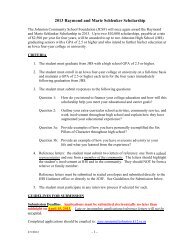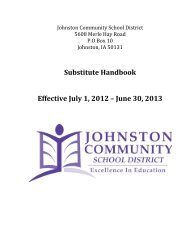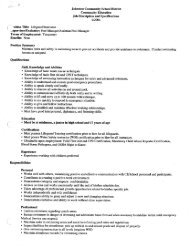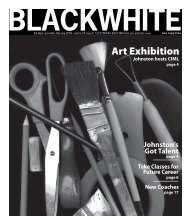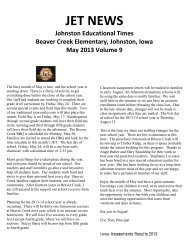8th Grade Course Descriptions - Johnston Community School District
8th Grade Course Descriptions - Johnston Community School District
8th Grade Course Descriptions - Johnston Community School District
You also want an ePaper? Increase the reach of your titles
YUMPU automatically turns print PDFs into web optimized ePapers that Google loves.
Required <strong>Course</strong>s (meet Every Day All Year)8 th <strong>Grade</strong> <strong>Course</strong> Description Guide2014-2015Language Arts – Reading, writing, listening, speaking, and critical thinking will be developedin alignment with the IA Common Core Curriculum.Social Studies – Study of American History from European exploration through 1865. This includesColonization, Revolution, forming a new nation, Westward Expansion, and the Civil War.Science – 8 th Science - Acquire and apply major concepts in science ORAccelerated Science - Physical science concepts and skillsPlacement based on demonstration of mastery of science skills on Iowa Assessments, MAP, andstandardized science testsPlacement determined after completion of 7 th grade and updated by school personnelMath - 8 th Math - Concepts and skills to prepare for 9 th Algebra8 th Algebra - Algebraic concepts and skillsPlacement based on demonstration of mastery of math skills on Iowa Assessments, MAP, andstandardized math testsPlacement determined after completion of 7 th grade and updated by school personnelCharacter & Career Development – (Required course that meets Every Day All Year)During this course, the students will discuss topics related to character and career planning. Lessons willfocus on the six pillars of character, 21 st century skills, peer pressure, bullying, time management, noteand test taking strategies, organizational skills, as well as many other topics. Students will take an onlineinterest survey, skills survey, and explore careers that align with both your interests and skills. They willalso explore courses offered at the high school and develop a draft of their four-year high school courseplan.Health - (Required course that meets Every Other Day One Semester)This course will discuss health issues, which will allow students to gain valuable knowledge to make informedhealth decisions. The course will cover physical fitness and nutrition, mental/emotional health,noncommunicable/communicable diseases, drugs/alcohol/tobacco, the reproductive system, sexually transmitteddisease and peer pressure influences. How all of these relate to the three components of health will also beaddressed (social, emotional/mental, physical).Technology - (Required course that meets Every Other Day One Semester)Students will cover a combination of activities using various computer based applications to develop and improvetheir skills in preparation for 9th grade technology courses. Technology Literacy is the ability of individuals toresponsibly use appropriate technology tools to: access and integrate information; and construct and communicateknowledge to improve learning and support lifelong learning. Some of the applications used will be: WordProcessing; Spreadsheets; Internet Searching; Slide Show Presentations; Concept Mapping; Ethical issues in an E-World; and History of Computers.Physical Education – (Required course that meets Every Other Day All Year)Functional fitness activities focusing on providing students with experience in various fitness equipment andteaching students about life-long fitness.OR
Optional ElectivesFrench I – (meets Every Day All Year)In this class students will be developing language skills in listening, speaking, reading, and writing inFrench. Learning the French alphabet and numbers, verb forms, grammar points, and simpleconversations are some of the skills learned in this beginning class. Continuing to take Frenchthroughout high school can accrue 12 college credits for the French student.Spanish I – (meets Every Day All Year)In this class, students will be learning the fundamentals of the Spanish language and about severalHispanic cultures. Students will be able to communicate in the present and near future tenses aboutdaily activities in a conversational manner. With practice, students will be able to ask and answerquestions, understand spoken Spanish, and speak with an accent that a native speaker would understand.Students will be provided with a textbook and packets to use throughout the year.Foreign Language is not a <strong>Johnston</strong> High <strong>School</strong> graduation requirement. WorldLanguage is not usually required for students attending a two-year college. Most fouryearuniversities (including Iowa and Iowa State) require two years of the same foreignlanguage for admission. Eighth grade foreign language courses are recognized forcollege admission, but students do not earn high school credit.Band – (meets Every Day All Year)<strong>8th</strong> <strong>Grade</strong> Band is a performance-based class that focuses on the study and performance of various stylesof high-quality band literature. This literature is used as a vehicle to explore the concepts of tone,balance, blend, intonation, rhythm, technique, and articulation. Students will participate and perform inthree concerts each year. In addition to the full ensemble component, each student is required to preparefor and attend small group lessons. In this smaller setting, students continue to develop skills on theirspecific instruments. Band students may also elect to audition for Jazz Band, which meets Mondays,Wednesdays, and alternating Fridays.Mixed Choir – (meets Every Other Day All Year)In choir, all students have the opportunity to sing in a mixed group setting in which they will learn vocalfundamentals such as breath support, diction, vowel modification, and performance techniques. Solfegesyllables and hand signs will be used to enhance sight-reading skills and improve part-singing. Studentswill participate in three concerts performing a varied repertoire of songs.
Exploratory Electives – (meets Every Other Day One semester)All classes are of an exploratory nature. Classes will be assigned depending upon the optional choices made and classavailability.Animal ScienceAnimal Science is a class, which introduces animal behavior, general characteristics, structure, and functionsof animal systems. The course includes the study of invertebrates, fishes, amphibians, reptiles, birds andmammals. Students journal through observation and interaction with the classroom mice as well as theAnimal Science Black Lab several times a month. A variety of guest speakers present diverse areas ofanimal science study and career opportunities.ArtIn this introductory 8 th grade class, students will explore the following topics: how to look at artwork in acritical way and discuss it, left brain vs. right brain thinking, narrative art, using Chinese ink and quill, reliefcarving and printmaking, using art to express emotion, how to draw the effects of light and shadow, Clay, thehistory of art and importance of it today, mixing colors, color schemes, and painting.Current EventsThe Des Moines Register will be used as a primary source for this course. Each day students will review atleast one article, which is relevant to the day’s discussion topic. Students will write a first person (50-wordsminimum) summary/opinion on the article to be turned in each day by the end of class. We will also bereviewing/using the Six Trait Writing techniques for your summary articles. One trait each week will beemphasized (Voice, Word Choice, Ideas, Organization, Sentence Fluency, and Conventions). All summariesmust be written in first person form as if you were present at the event/story when it happened.Current ScienceThis is an elective course about science topics, discoveries, and practices that are currently gaining attentionin the popular media. Class activities are designed to develop critical thinking skills, to apply priorknowledge and newly acquired knowledge in order to enhance classroom discussion, and to increase sciencevocabulary. Resources will include internet websites, educational videos, Science World magazine and otherpopular media.DramaDuring this elective class, students will look closely at what constitutes a dramatic scene as well asdeveloping character and believability on stage. Students will learn about stage movement, interpretation ofwritten text, and improvisation, as well as acting in, writing, and directing scenes of their own and/or thosesupplied by the instructor.EngineeringStudents will apply engineering problem solving skills to understand how to use the 3D solid modelingsoftware Autodesk Inventor. A step-by-step design process will assist in learning the Autodesk Inventorprogram. As student’s knowledge of the software grows they will begin custom designing a CO2 DragRacer. The CO2 Drag Racer will be constructed by the student in the Woodworking Lab using basic handtools. Students will design, visualize, and simulate their ideas before they build the CO2 Drag Racer. TheEngineering class allows students to produce a working model from the design stage all the way to themanufacture of a working CO2 Drag Racer. Students will have the opportunity to race their CO2 DragRacer against classmates’ cars at the conclusion of the quarter.Family Consumer ScienceThis class gives students knowledge that can be used in everyday life and prepares students for future Familyand Consumer Science courses. Topics include: safety in the kitchen, keeping foods safe to eat, basicmeasuring methods & recipe math, reading recipes, using kitchen appliances, know your equipment,personal wellness, child development, and covers some teen issue hot topics.
Exploratory Electives – (meets Every Other Day One semester)Fantasy MathThe inclusion of fantasy sports in learning environments has been shown to be a unique and effective methodto teach mathematics. Fantasy sports are games in which students create fantasy teams by picking real-lifeprofessional athletes, who earn points based on their performances in their games. Students track theirplayers' statistics and compute points for their teams using algebraic or non-algebraic methods thatcomplement the math skills they are learning. Students can follow their players in newspapers, online, or ontelevision.Financial LiteracyThis course is an introduction for Eighth <strong>Grade</strong> students as they become more aware of the importance ofFinancial Literacy. Material is presented in a way for students to see how it is applicable to their everydaylives. This class will help students develop the financial skills they need to make, manage, multiply, andprotect their hard-earned money. The course textbook is Chad Foster’s book, Financial Literacy for Teens.Students will be using calculators for various financial activities throughout the course. Readingcomprehension as well as math skills are an important part of the class. Figuring discounts, loan interest,balancing checkbooks, comparison shopping, calculating the cost of owning a car, and insurance costs aresome of the different units we will be covering.(ISR) Issues in Social ResponsibilityThis course will give students an overview of the judicial system. Students will view and discuss cases fromprevious years and analyze the process and decisions involved. The course also focuses on the causes ofsocial struggles and problems in American society. To understand social problems, the course will look atthe social, political, and economic conditions that perpetuate social problems. Such problems students willdiscuss will be racial and ethical tensions, poverty, crime, juvenile delinquency, gangs, substance abuse andother social ills. Many theories will be offered to explain the malfunction and struggles of a society alongwith student offered solutions to these problems.Math ApplicationsThis elective class involves the exploration of math in "real-world" applications. The class will be builtaround a series of projects that align to both <strong>8th</strong> <strong>Grade</strong> Common Core Standards and Mathematical Practices.Each project will help reinforce the mathematical learning from their core class and bring in elements fromother areas of study. Connections will be made to a wide variety of topics to engage students anddemonstrate how many places math is found throughout our world. We will also build problem solving andcritical thinking skills through cooperative group learning.Modern CulturesThis class focuses on modern American history and popular culture. Students will understand how popculture has shaped and changed America. The themes covered include the economy and stock market, warsin the Middle East (Iraq and Afghanistan), Communism and Cold War propaganda, and the Civil RightsMovement. Students will discover how historical influences impact current and world events and perpetuatea history of conflict in the United States and around the world.Our WorldIn this course, students will strengthen skills reading maps, graphs, and diagrams. They will also use variousmedia sources to review and discuss current events and how they shape “Our World.” Skills developed andtopics covered include: relative and absolute location, hemispheres, latitude and longitude, time zones,measuring distance, reading and making graphs along with reading, summarizing, and writing skills.Special ProgramsStudents involved in special programs (Special Education, Extended Learning Program, English LanguageLearner, etc.) will be assigned by their teachers into the appropriate classesIf you have questions, call the Student Service Office 515-278-1544, or contactLisa Boge, <strong>School</strong> Counselor at lisa.boge@johnston.k12.ia.us


